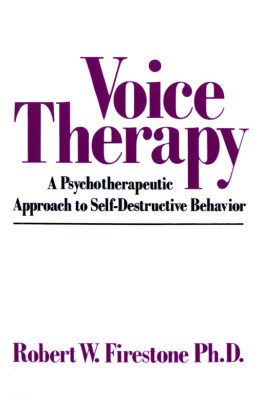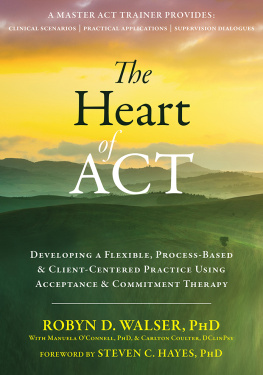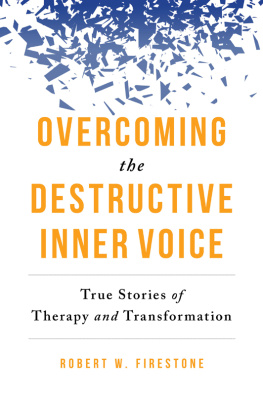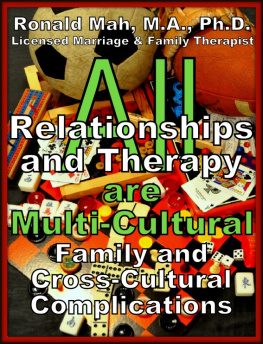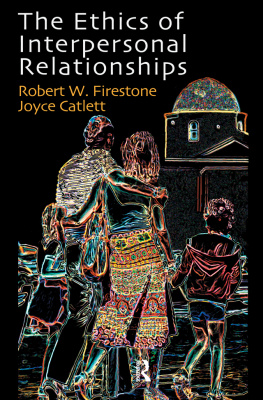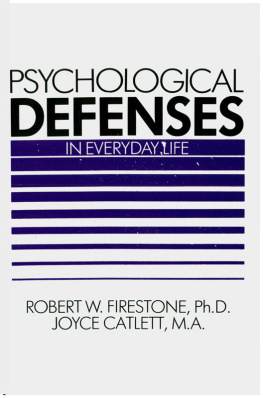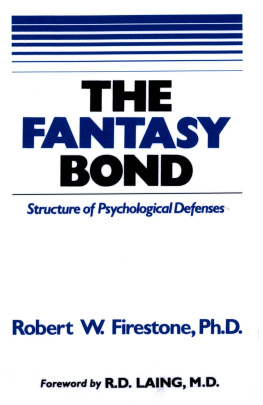Published 2016 by Prometheus Books
Overcoming the Destructive Inner Voice: True Stories of Therapy and Transformation. Copyright 2016 by Robert W. Firestone. All rights reserved. No part of this publication may be reproduced, stored in a retrieval system, or transmitted in any form or by any means, digital, electronic, mechanical, photocopying, recording, or otherwise, or conveyed via the Internet or a website without prior written permission of the publisher, except in the case of brief quotations embodied in critical articles and reviews.
The names, places, and other identifying facts about patients contained in this book have been fictionalized, and no similarity to any persons, living or dead, is intended.
In order to protect the identity and privacy of clients and others mentioned in this book, the names, places, and other identifying features of individuals have been fictionalized; the stories of some patients have been merged with those of others to further obscure and protect their actual identities.
Trademarked names appear throughout this book. Prometheus Books recognizes all registered trademarks, trademarks, and service marks mentioned in the text.
Cover image Ket4Up/Shutterstock
Cover design by Liz Mills
Cover design Prometheus Books
Inquiries should be addressed to
Prometheus Books
59 John Glenn Drive Amherst, New York 14228
VOICE: 7166910133 FAX: 7166910137
WWW.PROMETHEUSBOOKS.COM
20 19 18 17 16 5 4 3 2 1
Library of Congress Cataloging-in-Publication Data
Names: Firestone, Robert, author.
Title: Overcoming the destructive inner voice : true stories of therapy and transformation / by Robert W. Firestone.
Description: Amherst, New York : Prometheus Books, 2016. | Includes bibliographical references and index.
Identifiers: LCCN 2016027672 (print) | LCCN 2016028733 (ebook) | ISBN 9781633882515 (paperback) | ISBN 9781633882522 (ebook)
Subjects: | MESH: Mental Disorderstherapy | Psychotherapy | Mentally Ill Persons | Physician-Patient Relations | Case Reports
Classification: LCC RC480.5 (print) | LCC RC480.5 (ebook) | NLM WM 400 | DDC 616.89/14dc23
LC record available at https://lccn.loc.gov/2016027672
Printed in the United States of America


Our minds emerge from both our neural circuitry within our bodies and from the relationships that forge who we are from our earliest days. Our embodied and relational minds are the source of our selves, serving to limit and liberate who we become. When any of a combination of challenges to our minds bombards our development, conflicts may arise that bring great suffering and stifle our sense of freedom and connection.
In this deep dive into the experiences of inner conflict, our visionary guide, Robert Firestone, PhD, offers us wise counsel and fascinating autobiographical accounts of how his important and innovative voice therapy first arose in his own mind, and then how it became a therapeutic practice to help alleviate this enemy within.
This insightful book offers us a chance to consider how our thoughts are molded by our experiences to either support or challenge our well-being. The psychologist Lev Vygotsky stated long ago that thought is internalized dialogue, meaning we take in our conversationsour communication with othersand shape our own inner voices based on what we've experienced earlier in our lives (1986). Sadly, if such experiences don't go so well, we may have a robust chorus of voices and aspects of our personality, what can be called self-states, that may create all sorts of havoc in our lives if we don't learn to integrate them well.
Differentiating these voices from each other and from inner sentiments that are more productive rather than destructive is a crucial starting place for healing. In many ways, this is how we challenge the enemy within as we differentiate and then link these often-demanding and loud voices with a larger sense of the breadth and depth of who we are beyond these often-limiting hostile self-states.
We ignore these inner voices at our own peril. If we believe their absence from consciousness is proof of their absence from our lives, sadly we may be quite mistaken. In this powerful set of stories, you will see firsthand how a master clinician and psychotherapy innovator helps others, and himself, to integrate the mind by freeing the psyche from the prisons of the past.
Research in the field of attachment also reveals that how we are treated by our caregivers directly shapes the function and structure of our brains (Siegel 2012). A fragmented internal sense of self is evident in the dissociation manifest in disorganized attachment (see the range of studies referenced below, including Weinfield et al. 2004). Disorganized attachment can arise with various intensities of terrifying parental behavior, severe abuse, and neglect, which research has demonstrated can lead to impairments in the growth of the integrative fibers of the brain (Teicher 2006, 2007).
In addition, the regulating non-DNA molecules that sit atop our genesour epigenetic regulatorscan be affected by our environment. Fortunately, we are now in a position to scientifically understand that experience, genetic factors, and epigenetic factors lead either to growth or to inhibition of neural connectivity, to either healthy integration or to dysregulated mental life, with the accompanying extremes of the nonintegrated states of chaos and rigidity. Hostile inner voices may be an example of the latter condition: They can be chaotically intrusive and rigidly unyielding.
As you read the pages of this intriguing book, it may be helpful to keep in mind that mental dysfunctionwhether it is experientially caused or primarily of genetic origins, or some combination of bothseems to be associated with impediments to neural integration. Healing would mean cultivating integration to create harmony out of a life that used to be filled with chaos or rigidity.
This classic accounting takes us deeply into the challenges to our internal equilibrium. Here you will find in-depth discussions of how to assess the mindscape of internal voices and how to help individuals overcome the chaotic and rigid states they can create. You'll be given a feast of stories that can help you both understand and know how to approach hostile inner voices. Such a meticulous accounting of in-depth clinical encounters is not seen much these days, and so this new book about a life's work is a contribution to us all.
The journey we are all on is a lifespan adventure, and it is never too late to find new ways to integrate the many layers of who we are. Soak in the wisdom of our guide's life experiences, and enjoy this fascinating journey of discovery!
I want to express my appreciation to Tamsen Firestone, Jo Barrington, and Susan Short, for their inspirational efforts in editing these stories. I am especially grateful to Joyce Catlett and to Jina Carvalho, communications director of the Glendon Association, who worked closely with Claire Gerus, literary agent, to place this book with our publisher. My appreciation goes to Steven L. Mitchell, editor-in-chief at Prometheus Books, for his encouragement and support of my work, to Jade Zora Scibilia, senior editor, for her insightful suggestions regarding editorial changes, and to Hanna Etu, editorial assistant, for her attention to important details of this project.


